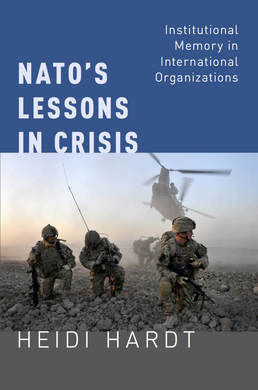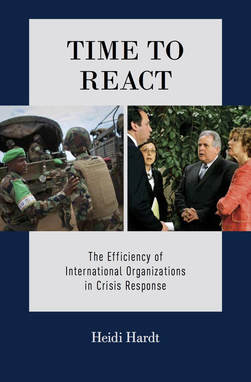HEIDI HARDT
NATO's Lessons in Crisis:
Institutional Memory in International Organizations
(Oxford University Press, 2018)
|
Watch a short video interview about the book
Check out the online resource for additional quotes and more! Strategic errors cost lives. Some international organizations (IOs) learn from such failures whereas others tend to repeat them. Given that IOs experience high rates of turnover, how is it possible that any IO retains knowledge about the past? This book introduces an argument for how and why IOs develop institutional memory of strategic errors in international crisis management. The design of learning infrastructure - from lessons learned offices to lesson databases - can inadvertently disincentivize IO elites (i.e. high-level officials) from using it. Given the risks, elites instead largely rely on transnational interpersonal networks, as well as private documentation and conversations. Memory survives but remains highly dependent on a few individuals. The book draws on the author's interviews and a survey experiment with 120 NATO elites. Cases from Afghanistan, Libya and Ukraine further illustrate the argument. Findings challenge existing organizational learning scholarship - suggesting that formal learning processes alone are insufficient for learning; design matters. The book concludes with policy recommendations for strengthening IOs' capacity for knowledge retention. |
Time to React:
The Efficiency of International Organizations in Crisis Response
(Oxford University Press, 2014)
|
In conflict-affected communities, delays in international response can have life or death consequences for the individuals living within them. The speed with which international organizations react to crises affects the prospects that peace can be re-established. Why then do some international organizations take longer than others to answer calls for intervention? To answer this question and explore options for reform, Time to React builds on contemporary scholarship with original data on response rates and interview evidence from 50 ambassadors across four leading organizations (AU, EU, OAS and OSCE). The explanation for variation in speed ultimately lies in core differences in institutional cultures across organizations. Although wealth and capabilities can strengthen a peace operation, it is the unspoken rules and social networks of peace and security committees at these organizations that dictate the pace with which an operation is established. This book offers a first analysis of the critical importance of and conditions shaping timeliness of crisis response by international organizations.
|
Proudly powered by Weebly

